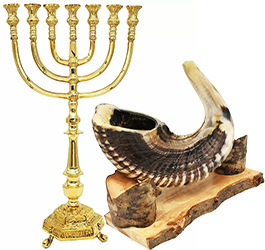How to Celebrate Biblical feasts

Are you looking for a way to bring some joy and meaning into your spiritual life? Have you ever thought about celebrating the Biblical feasts? The seven feasts found in the Bible are meaningful reminders of God’s faithfulness and His plan of salvation.
The seven feasts of the Bible are Passover, Unleavened Bread, First Fruits, Weeks (or Pentecost), Trumpets (or Rosh HaShanah), Day of Atonement (or Yom Kippur), and Tabernacles (or Sukkot). Each of these feasts has a special significance for the people of God.
Passover is the celebration of the Exodus – the event that marked the beginning of the nation of Israel. It is the remembrance of God’s saving grace and his deliverance of his chosen people from slavery in Egypt. It is the celebration of deliverance from sin and death.
Unleavened Bread commemorates the Exodus as well, but this feast also marks a new beginning. It is a week-long celebration that is intended to remind us of what it means to be set apart and holy.
First Fruits celebrates the season of harvest – the plentiful blessings God has provided for His people. It is a reminder to always give thanks to and to trust in the Lord for every blessing.
Weeks (or Pentecost) celebrates the giving of the Law and the words of God to Moses on Mt. Sinai. It is a reminder of the covenant God made with His people to bring them back into right relationship with Him.
Trumpets (or Rosh HaShanah) is the celebration of the Hebrew New Year. It is a time of reflecting on the past and looking ahead to the future with hope and expectation.
Day of Atonement (or Yom Kippur) is the most solemn of the feasts. It is the day of repentance and fasting. It is the day to remember our sins and turn to God for forgiveness and redemption.
Tabernacles (or Sukkot) marks the end of the harvest season. It is a time of rejoicing over the blessings God gives us. This feast brings us all together to enjoy being in each other’s company and to thank God for His love and kindness.
The seven Biblical feasts are full of significance and meaning. Celebrating them can be a great way to deepen your spiritual life and become more aware of God’s grace. So why not take the initiative and start celebrating these feasts in your own home this year? It can be a great way to bring more joy and meaning into your spiritual life.
It is very common for Christians, when they are reminded of the feasts of Israel, to see them as a culture foreign to our culture or customs. But if we examine the Word of God, we realize that the feasts of the Jews are really God’s feasts, and therefore, they belong to God.
To celebrate the Jewish feasts is not to turn away from the grace and work of salvation, but to come to a better understanding and appreciation of Christ’s work on the cross. The early Christians used to keep these same feasts as a reminder of the deliverance from sin they receive through the free grace of Jesus Christ. Once we realize the great importance of the biblical feasts for humans, and the priceless value they have for today’s world, it is important to understand more about how to celebrate them.
For example, some of the biblical feasts have specific forms of celebration that make them different from others. Only in the Passover, we partake of bread and wine as symbols of Christ’s death. In the Feast of Unleavened Bread, God commands us to remove the leaven from our homes (both natural and sinful) and the Day of Atonement is unique in the sense that it is the only feast that is kept with fasting and prayer.
The proper celebration of these feasts includes their recognition and due observance of the precepts that distinguish them, which are intended to teach us spiritual lessons and exemplify the life of Christ. Remember that these days are holy to God, they are the solemn feasts of the Eternal, which He proclaims as holy convocations (Leviticus 23:2).


Leave a Reply
You must be logged in to post a comment.